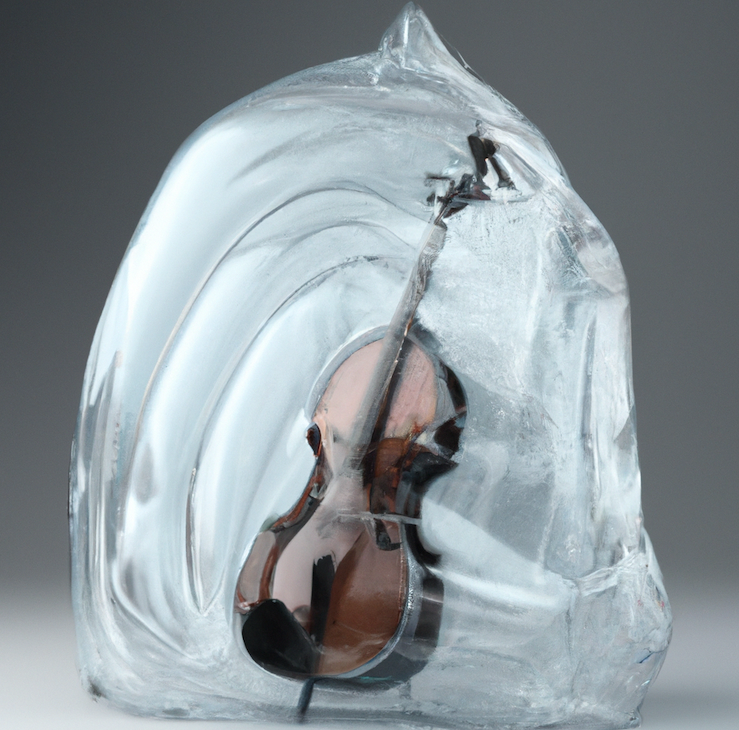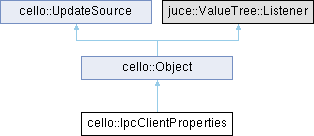 |
cello
JUCE ValueTrees for Humans
|
 |
cello
JUCE ValueTrees for Humans
|
Properties struct to monitor an IPC client. Created automatically when creating an IpcClient object, and will be named after the cello Object that's connected to the IpcClient, with the string "IpcClient" appended. More...
#include <cello_ipc.h>

Public Member Functions | |
| IpcClientProperties (const juce::String &name, Object *state) | |
| MAKE_VALUE_MEMBER (bool, connected, false) | |
| MAKE_VALUE_MEMBER (int, rxCount, 0) | |
| MAKE_VALUE_MEMBER (int, txCount, 0) | |
 Public Member Functions inherited from cello::Object Public Member Functions inherited from cello::Object | |
| Object (const juce::String &type, const Object *state) | |
| Construct a new cello::Object object, which will attempt to initialize from the 'state' parameter. If 'state' contains a ValueTree of the requested type, we'll use that as our store. | |
| Object (const juce::String &type, const Object &state) | |
Construct a new Object, initializing from the state argument. Follows the same descent logic used in the above constructor. | |
| Object (const juce::String &type, juce::ValueTree tree) | |
| Construct a new Object from a raw juce ValueTree. Its behavior mimics that of the ctor that accepts a pointer to object, attempting to either: | |
| Object (const juce::String &type, juce::File file, FileFormat format=FileFormat::xml) | |
Construct a new Object by attempting to load it from a file on disk. You can test whether this succeeded by checking the return value of getCreationType() – if its value is CreationType::initialized, the load from disk failed, and this instance was default-initialized. | |
| Object (const Object &rhs) | |
| Construct a new Object object as a copy of an existing one. We register as a listener, but this new copy does not have any callbacks registered. Both objects will point at the same shared value tree. | |
| CreationType | wrap (const Object &other) |
| Wrap another Object's tree after this object is created. | |
| Object & | operator= (const Object &rhs) |
set this object to use a different Object's value tree, which we will begin listening to. Our valueTreeRedirected callback should be executed. | |
| ~Object () override | |
| Destroy the Object object The important thing done here is to remove ourselves as a listener to the value tree we're attached to. | |
| bool | operator== (const juce::ValueTree &rhs) const noexcept |
test for true equivalence: does this object point to the same underlying tree as the tree on the right hand side? Note that because cello::Object has operator juce::ValueTree, you can pass a reference to Object as the rhs and it will work correctly. | |
| bool | operator!= (const juce::ValueTree &rhs) const noexcept |
| juce::Identifier | getType () const |
| Get the type of this object as a juce::Identifier. | |
| juce::String | getTypeName () const |
| Get the type of this object as a string. | |
| juce::String | toXmlString (const juce::XmlElement::TextFormat &format={}) const |
| Generate a string representation of this object's tree. | |
| CreationType | getCreationType () const |
| Determine how this object was created, which will be one of: | |
| bool | wasWrapped () const |
| utility method to test the creation type as a bool. | |
| bool | wasInitialized () const |
| utility method to test the creation type as a bool. | |
| operator juce::ValueTree () const | |
| Get the ValueTree we're using as our data store. | |
| juce::ValueTree | clone (bool deep) const |
| Make and return a copy of our underlying value tree. | |
| void | update (const juce::MemoryBlock &updateBlock) |
| Apply delta/update generated by the juce::ValueTreeSynchroniser class; this is used in the sync and ipc implementations. | |
| void | excludeListener (juce::ValueTree::Listener *listener) |
| A listener to exclude from property change updates. | |
| juce::ValueTree::Listener * | getExcludedListener () const |
| Get a pointer to the listener to exclude from property change updates. | |
| juce::ValueTree | find (const cello::Query &query, bool deep=false) |
| Perform a query against the children of this Object, returning a new ValueTree containing zero or more copies of child trees that match the query, possibly sorted into a different order than they exist in this tree. | |
| juce::ValueTree | findOne (const cello::Query &query, bool deep=false) |
| Perform a query against the children of this object, returning a copy of the first child found that meets the predicates in the query object, or an empty tree if none is found. | |
| int | remove (const cello::Query &query) |
| Remove all children from the tree that match the query. | |
| bool | upsert (const Object *object, const juce::Identifier &key, bool deep=false) |
Update or insert a child object (concept borrowed from MongoDB) Looks for a child with a 'key' value that matches the one found in the object we've been passed. If a match is found, we update the entry in place (update). If no match is found, we append a copy of object to our children. | |
| void | upsertAll (const Object *parent, const juce::Identifier &key, bool deep=false) |
| Perform an upsert using each of the children of the parent being passed. Common workflow here: | |
| void | setUndoManager (juce::UndoManager *undo) |
| Set the undo manager to use in this object (and others created from it). | |
| juce::UndoManager * | getUndoManager () const |
| Get the current undo manager; only useful to this object's Value objects and when creating other Objects to wrap our subtrees. | |
| bool | canUndo () const |
| Test whether this object/tree has anything that can be undone. | |
| bool | undo () |
| Attempt to undo the last transaction. | |
| bool | canRedo () const |
| Test whether this object/tree has anything that can be redone. | |
| bool | redo () |
| Attempt to redo the last transaction. | |
| void | clearUndoHistory () |
| reset the undo manager | |
| template<typename T> | |
| T | getattr (const juce::Identifier &attr, const T &defaultVal) const |
| Get a property value from this object, or default if it doesn't have a property with that name. | |
| bool | hasattr (const juce::Identifier &attr) const |
| test the object to see if it has an attribute with this id. | |
| template<typename T> | |
| Object & | setattr (const juce::Identifier &attr, const T &attrVal) |
| Set a new value for the specified attribute/property. We return a reference to this object so that setattr calls may be chained. | |
| void | delattr (const juce::Identifier &attr) |
| Remove the specified property from this object. | |
| Iterator | begin () |
| Iterator | end () |
| juce::ValueTree | operator[] (int index) const |
| return a child tree of this object by its index. NOTE that it does not return an object; to work with this data in its cello::Object form, you'll need to use this tree to create a new one, probably testing its type to make sure you're creating the correct Object type from it. | |
| int | getNumChildren () const |
| Check how many children this object has. | |
| void | append (Object *object) |
| Add a new child object to the end of our child object list,. | |
| void | insert (Object *object, int index) |
| add a new child object at a specific index in the list. | |
| Object * | remove (Object *object) |
| Attempt to remove a child object from this. | |
| juce::ValueTree | remove (int index) |
| remove a child by its index. | |
| void | move (int fromIndex, int toIndex) |
| Change the position of one of this object's children. | |
| template<typename Comparator> | |
| void | sort (Comparator &comp, bool stableSort) |
| Sort this object's children using the provided comparison object. | |
| void | onPropertyChange (const juce::Identifier &id, PropertyUpdateFn callback) |
| Install (or clear) a function to be called when one of this Object's properties changes. A cello extension to this mechanism is that you can pass in the type id of this tree, and you'll receive a callback on that key when any of the other properties that don't have a handler have changed. | |
| void | onPropertyChange (PropertyUpdateFn callback) |
| install or clear a generic callback that will be called when any property in the object changes. The identifier of the property that changed will be passed to the callback. | |
| void | onPropertyChange (const ValueBase &val, PropertyUpdateFn callback) |
| register a property change callback by passing in a reference to a Value object instead of its id. | |
| juce::Result | save (juce::File file, FileFormat format=FileFormat::xml) const |
| Save the object tree to disk. | |
 Public Member Functions inherited from cello::UpdateSource Public Member Functions inherited from cello::UpdateSource | |
| void | forceUpdate (bool shouldForceUpdate) |
| If passed true, any call that sets any Value property on this Object will result in a property change update callback being executed. Default (false) behavior only performs this callback when the underlying value is changed. | |
| bool | shouldForceUpdate () const |
Additional Inherited Members | |
 Public Types inherited from cello::Object Public Types inherited from cello::Object | |
| enum class | FileFormat { xml , binary , zipped } |
| enum class | CreationType { initialized , wrapped } |
| using | Iterator = juce::ValueTree::Iterator |
| using | ChildUpdateFn = std::function<void (juce::ValueTree& child, int oldIndex, int newIndex)> |
| using | SelfUpdateFn = std::function<void (void)> |
| static juce::ValueTree | load (juce::File file, FileFormat format=FileFormat::xml) |
| Reload data from disk. Used in the ctor that accepts file name and format. | |
| ChildUpdateFn | onChildAdded |
| ChildUpdateFn | onChildRemoved |
| ChildUpdateFn | onChildMoved |
| SelfUpdateFn | onParentChanged |
| SelfUpdateFn | onTreeRedirected |
 Protected Attributes inherited from cello::Object Protected Attributes inherited from cello::Object | |
| juce::ValueTree | data |
| The tree where our data lives. | |
| juce::UndoManager * | undoManager { nullptr } |
| The undo manager to use for set() operations. | |
| CreationType | creationType { CreationType::wrapped } |
| Remember how this Object was created. | |
| juce::ValueTree::Listener * | excludedListener { nullptr } |
| a listener to not update when properties change. | |
| bool | doForceUpdates { false } |
Properties struct to monitor an IPC client. Created automatically when creating an IpcClient object, and will be named after the cello Object that's connected to the IpcClient, with the string "IpcClient" appended.